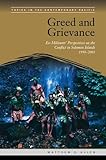Greed and Grievance : Ex-Militants' Perspectives on the Conflict in Solomon Islands, 1998-2003 / Matthew G Allen.
Material type: TextPublisher: Honolulu : University of Hawaii Press, [2013]Copyright date: ©2013Description: 1 online resource (264 p.) : 12 illus., 3 mapsContent type:
TextPublisher: Honolulu : University of Hawaii Press, [2013]Copyright date: ©2013Description: 1 online resource (264 p.) : 12 illus., 3 mapsContent type: - 9780824838546
- 9780824839222
- 995.93 23
- DU850 .A688 2014
- online - DeGruyter
- Issued also in print.
| Item type | Current library | Call number | URL | Status | Notes | Barcode | |
|---|---|---|---|---|---|---|---|
 eBook
eBook
|
Biblioteca "Angelicum" Pont. Univ. S.Tommaso d'Aquino Nuvola online | online - DeGruyter (Browse shelf(Opens below)) | Online access | Not for loan (Accesso limitato) | Accesso per gli utenti autorizzati / Access for authorized users | (dgr)9780824839222 |
Browsing Biblioteca "Angelicum" Pont. Univ. S.Tommaso d'Aquino shelves, Shelving location: Nuvola online Close shelf browser (Hides shelf browser)

|

|

|

|

|

|

|
||
| online - DeGruyter Beyond Ainu Studies : Changing Academic and Public Perspectives / | online - DeGruyter Gender and Law in the Japanese Imperium / | online - DeGruyter Dubious Gastronomy : The Cultural Politics of Eating Asian in the USA / | online - DeGruyter Greed and Grievance : Ex-Militants' Perspectives on the Conflict in Solomon Islands, 1998-2003 / | online - DeGruyter Tsai Ming-liang and a Cinema of Slowness / | online - DeGruyter Mary Sia's Classic Chinese Cookbook / | online - DeGruyter Nothingness and Desire : A Philosophical Antiphony / |
Frontmatter -- Contents -- From the General Editor -- Preface -- Acknowledgments -- Bibliographic Conventions -- Chapter 1. Introduction -- Chapter 2. Solomon Islands and the Tension -- Chapter 3. Kastom, Class, and Colonization -- Chapter 4. Guadalcanal: The Contested Motherland -- Chapter 5. Saving the Solomons: The Malaita Eagle Force -- Chapter 6. Continuities and Symmetries -- Chapter 7. The State, Resources, Identity, and Conflict -- Appendix 1. "A Brief History of Ethnic Tension (South Guadalcanal)" -- Appendix 2. "Guadalcanal Struggle for Freedom: Our History in Brief" -- Notes -- References -- Index
restricted access online access with authorization star
http://purl.org/coar/access_right/c_16ec
This work offers important new perspectives on the violence and unrest that gripped Solomon Islands between late 1998 and mid-2003, a period known as the Ethnic Tension. Based on in-depth interviews and documents associated with the "Tension Trials," it is the first detailed account of the conflict that engages directly with the voices of the men who joined the rival militant groups. These contemporary voices are presented against the backdrop of the socioeconomic and cultural history of Solomon Islands.The findings provide a refreshing corrective to the pervasive framing of the Isatabu uprising and the Malaitan response as essentially criminal and apolitical activities driven by the self-interest of those who participated in them. Alternative motives for the men who participated in the Solomons conflict are elucidated, foremost of which are their own conceptions of history and of the places of their respective peoples in the historical processes of colonization, development, and nation-building. Uneven development, relative deprivation and rapid socioeconomic and cultural change are highlighted as salient structural causes of the unrest.
Issued also in print.
Mode of access: Internet via World Wide Web.
In English.
Description based on online resource; title from PDF title page (publisher's Web site, viewed 02. Mrz 2022)


